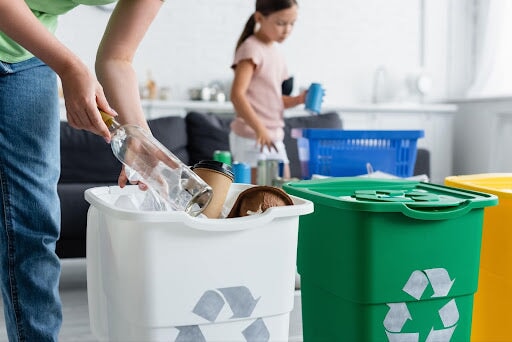
TLDR
In a world where convenience often trumps sustainability, the idea of reducing waste at home, whether it be food waste, solid waste, or organic waste, may seem like a daunting task. However, it's precisely this mindset that has led to the alarming levels of waste generation we see today. The truth is, each one of us has the power to make a significant impact by making small, mindful changes in our daily routines. It's not just about saving the planet; it's about redefining how we coexist with it. We should think of ways on how to reduce water waste or any type of waste in our daily lives. In this guide, we'll explore practical and effective ways to reduce different types of waste at home, because, let's face it, it's what our planet desperately needs.
Understanding the Importance of Waste Reduction
Before diving into the actionable steps, it's crucial to grasp the gravity of the situation. The impact of waste on our environment is far-reaching and often underestimated. Each piece of trash we produce has a story, and unfortunately, it's not one with a happy ending.
Mountains of plastic, towering landfills, and polluted oceans are stark reminders of our collective responsibility. The production and disposal of waste contribute to greenhouse gas emissions, soil contamination, and the depletion of natural resources. It's a cycle that perpetuates environmental degradation.
However, amidst this sobering reality lies an opportunity for change. By recognizing the profound influence of waste generation on our planet, we empower ourselves to take meaningful action. Together, we can rewrite the narrative, steering it towards a more sustainable, harmonious future. It's a journey that begins with understanding, but culminates in tangible, positive impact.
The Environmental Impact of Household Waste
Every piece of paper, plastic, or organic material that ends up in a landfill contributes to a growing problem. Landfills emit harmful greenhouse gasses, contaminate soil and water, and take up valuable space. Moreover, the production of disposable items requires the consumption of natural resources, further depleting our already strained planet. It's a vicious cycle that can only be broken by conscious, deliberate action.
The staggering volume of waste we generate daily exacerbates these issues. It leads to the release of methane, a potent greenhouse gas, further intensifying the impact on our climate. Landfills become breeding grounds for pollution, leaching harmful chemicals into the surrounding environment. The consequence is far-reaching, affecting ecosystems, wildlife, and ultimately, human health.
By acknowledging the profound repercussions of our waste habits, we hold the key to change. Adopting sustainable practices and choosing eco-conscious alternatives are critical steps towards mitigating this environmental crisis. Together, we have the power to break free from this cycle and pave the way for a cleaner, healthier planet.
Practical Steps to Minimize Waste at Home
As we step into the realm of practicality, let's explore a range of impactful strategies that can seamlessly integrate into your daily routine. These steps not only streamline your lifestyle but also play a crucial role in minimizing waste generation.
By incorporating these practices into your everyday life, you not only contribute to a healthier planet but also set a powerful example for others to follow. Small changes can lead to big impacts, and collectively, we can make a substantial difference in reducing waste and preserving our precious natural resources. It's a journey that starts at home, but its effects ripple far beyond.
1. Utilize Reusable Containers
Investing in high-quality, durable containers is a cornerstone in the journey towards waste reduction. These versatile vessels serve as guardians of leftovers, bulk items, and packed lunches. By doing so, you not only bid farewell to disposable plastic wrap and foil but also ensure your food stays fresher for extended periods. This simple yet effective shift in storage practices not only benefits the environment but also leads to cost savings over time, making it a win-win solution for both your wallet and the planet.
2. Stop Using Disposable Items in the Kitchen
In the heart of every kitchen lies a trove of disposable items—plastic wrap, ziplock bags, and aluminum foil. Their reusable counterparts, such as cloth wraps and silicone food storage bags, herald a new era of sustainability. These alternatives not only save you money in the long run but also substantially curtail plastic waste, making your kitchen a greener space. By making this shift, you're not only contributing to a more sustainable future but also creating a more eco-conscious, waste-free cooking environment for yourself and your loved ones.
3. Ditch Individually Packaged Food
Say goodbye to individually wrapped portions and embrace larger quantities of pantry staples and snacks. Not only does this reduce packaging waste, but it often comes at a lower cost per unit. It's a win-win situation that not only benefits your wallet but also alleviates the burden on our planet. By making this shift towards bulk items, you're not only saving money, but you're also contributing to a more sustainable food system that minimizes unnecessary packaging waste.
4. Buy in Bulk
A pilgrimage to bulk stores presents an opportunity to fine-tune your purchasing habits. Here, you can procure precisely the amount you need, minimizing excess packaging. This thoughtful approach not only reduces waste but also allows for better control over portion sizes and reduces the likelihood of food spoilage. Additionally, buying in bulk often translates to cost savings in the long run, making it a budget-friendly and sustainable choice. And don't forget to bring along your trusty reusable bags and containers to further diminish waste, creating a truly eco-conscious shopping experience.
5. Shop Locally
Embarking on a journey of local consumption is a powerful way to shrink your carbon footprint. By supporting nearby farmers and artisans, you drastically reduce the emissions associated with long-distance transportation. This choice not only supports the local economy but also fosters a sense of community. Additionally, the products you obtain are often fresher and more sustainably sourced, contributing to a healthier, more harmonious ecosystem. By making a conscious effort to choose local options, you're actively participating in the larger movement towards a more environmentally responsible way of living.
6. Shop Secondhand
Venturing into the realm of pre-loved items is a testament to conscious consumerism. Whether it's clothing, furniture, or kitchenware, buying secondhand reduces the demand for new products and the waste generated in their production. It's a choice that aligns with a more sustainable, circular economy. By opting for secondhand goods, you extend the lifespan of items and divert them from landfills, promoting a more eco-friendly approach to consumption. Plus, the unique character of vintage or pre-owned items can add a distinctive touch to your home and wardrobe.
7. Don't Forget to Bring Your Reusable Bags
A simple habit with profound implications—keeping a stash of reusable shopping bags within arm's reach ensures you never leave home unprepared. This proactive approach significantly cuts down on your consumption of plastic bags, making it a small yet impactful step towards waste reduction. It's a gesture that speaks volumes, showing your commitment to a more sustainable lifestyle. Reusable bags are not only sturdy and reliable but also come in various stylish designs, allowing you to make a statement while making a difference.
8. Choose Paperless Billing
In an age dominated by digital convenience, opting for electronic statements and invoices is a small change that yields significant results. By doing so, you contribute to a reduction in paper waste, playing your part in preserving our precious natural resources. This shift towards paperless billing not only streamlines your own administrative tasks but also helps conserve forests and energy used in paper production. It's a choice that embraces the efficiency of the digital age while minimizing our environmental footprint, marking a positive step towards a more sustainable future.
9. Invest in Sustainably Made Products
Prioritizing products crafted from recycled materials or bearing eco-friendly certifications fosters a shift towards responsible production practices. By supporting businesses committed to sustainable sourcing and manufacturing, you actively participate in the larger movement towards a more environmentally conscious future. These choices signal to industries that consumers demand and value eco-friendly alternatives, thereby encouraging more widespread adoption of sustainable practices. It's a collective effort that drives positive change, pushing for a future where sustainability is at the forefront of product development and consumer choices.
10. Try Composting
Transforming food scraps and yard waste into nutrient-rich compost is a practice with dual benefits. Not only does it divert organic waste from landfills, but it also enhances the fertility of your soil in a natural, chemical-free manner. It's a sustainable cycle that harmonizes with the environment. Composting not only reduces greenhouse gas emissions from decomposing organic matter in landfills but also creates a valuable resource for enriching your garden or landscaping. It's a simple yet powerful step towards a more sustainable, closed-loop system.
11. Embracing a Zero-Waste Lifestyle
While achieving a fully zero-waste lifestyle may be an ambitious goal, adopting its principles is a powerful step towards waste reduction. This lifestyle shift involves deliberate consumption, effective waste management, and a steadfast commitment to reusing and recycling whenever possible. Remember, every conscious choice brings us one step closer to a more sustainable future. Embracing a zero-waste lifestyle means continually seeking alternatives that minimize waste generation, from using reusable items to creatively repurposing materials. It's a journey marked by progress, not perfection, where every effort counts towards a more sustainable, waste-conscious way of living.
Reel Paper: Making a Sustainable Difference
In the quest to reduce waste, choosing the right products can make all the difference. Reel Paper offers a range of eco-friendly options, including recycled paper towels, recycled facial tissues, and bamboo toilet paper. These products not only deliver the quality and convenience you expect but also contribute to a more sustainable future.
Reducing waste at home is not about making drastic sacrifices; it's about making smarter choices. Each small step we take contributes to a larger movement towards a more sustainable and harmonious world. By embracing these practical solutions and supporting eco-conscious brands like Reel Paper, we can all play a part in reshaping our planet's future. So let's roll up our sleeves, grab our reusable bags, and embark on this waste-reducing journey together!



0 comments